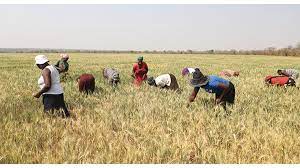Zimbabwe has set its largest wheat harvest in 2022 that reached 375,000 tons, making the landlocked country in southern Africa a self-sufficient agricultural powerhouse, which is a unique performance on the continent.
The harvest in 2022 was 13% higher than the previous year, breaking a half-century old record. The area sown to wheat has increased by 10% and, above all, the state has set up a policy of distributing fertilizer and buying crops via a public body, the Grain Marketing Board, which has won over farmers. Hence, Zimbabwe no longer needs to import wheat to meet its needs, saving up to 300 million dollars in import costs. In the current context where African countries are suffering from the absence or high cost of Russian and Ukrainian wheat, Zimbabwe stands out for its proactive policy.
However, although the country can pride itself on being a unique example in Africa for wheat, not everything is rosy. The Grain Marketing Board is having the worst difficulties paying farmers. Less than a quarter of the crop has been purchased, despite government assurances and the release of emergency funds. The maize sector, the main cereal consumed in the country, is also progressing, but remains insufficient to meet national needs. In general, Zimbabwe’s agricultural yields remain below the African average, according to some experts.
“For the first time in our country since 2004, we have never had such a bumper harvest of wheat. We are looking at high yields,” Zimbabwe’s Information Minister, Monica Mutsvangwa, commented. “We are not yet looking at exporting but we are happy that what we are producing this year will cover more than a year of consumption.”
Wheat is grown entirely under irrigation during the winter season in Zimbabwe. In 2022, more than 80 000 hectares of agricultural land was put under wheat production nationwide, with many new farmers venturing into the sector.



